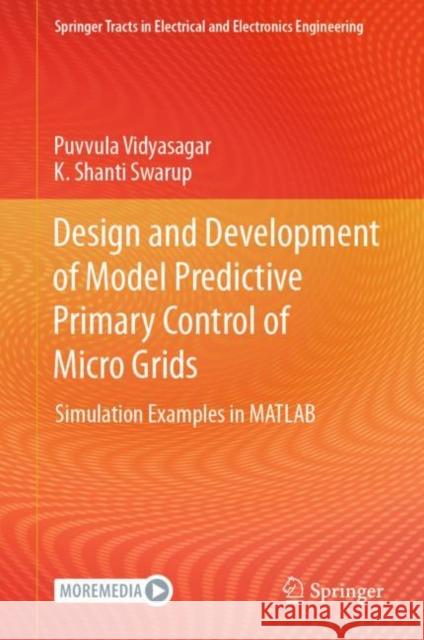Design and Development of Model Predictive Primary Control of Micro Grids: Simulation Examples in MATLAB » książka
Design and Development of Model Predictive Primary Control of Micro Grids: Simulation Examples in MATLAB
ISBN-13: 9789811958519 / Angielski / Twarda / 2023 / 158 str.
Design and Development of Model Predictive Primary Control of Micro Grids: Simulation Examples in MATLAB
ISBN-13: 9789811958519 / Angielski / Twarda / 2023 / 158 str.
(netto: 498,38 VAT: 5%)
Najniższa cena z 30 dni: 501,19
ok. 22 dni roboczych.
Darmowa dostawa!
This book provides a design and development perspective MPC for micro-grid control, emphasizing step-by-step conversion of a nonlinear MPC to linear MPC preserving critical aspects of nonlinear MPC. The book discusses centralized and decentralized MPC control algorithms for a generic modern-day micro-grid consisting of vital essential constituents. It starts with the nonlinear MPC formulation for micro-grids. It also moves towards the linear time-invariant and linear time-variant approximations of the MPC for micro-grid control. The contents also discuss how the application of orthonormal special functions can improve computational complexity of MPC algorithms. It also highlights various auxiliary requirements like state estimator, disturbance compensator for robustness, selective harmonic eliminator for eliminating harmonics in the micro-grid, etc. These additional requirements are crucial for the successful online implementation of the MPC. In the end, the book shows how a well-designed MPC is superior in performance compared to the conventional micro-grid primary controllers discussed above. The key topics discussed in this book include – the detailed modeling of micro-grid components; operational modes in micro-grid and their control objectives; conventional micro-grid primary controllers; the importance of MPC as a micro-grid primary controller; understanding of MPC operation; nonlinear MPC formulation; linear approximations of MPC; application of special functions in the MPC formulation; and other online requirements for the MPC implementation. The examples in the book are available both from a calculation point of view and as MATLAB codes. This helps the students get acquainted with the subject first and then allows them to implement the subject they learn in software for further understanding and research.
This book provides a design and development perspective MPC for micro-grid control, emphasizing step-by-step conversion of a nonlinear MPC to linear MPC preserving critical aspects of nonlinear MPC. The book discusses centralized and decentralized MPC control algorithms for a generic modern-day micro-grid consisting of vital essential constituents. It starts with the nonlinear MPC formulation for micro-grids. It also moves towards the linear time-invariant and linear time-variant approximations of the MPC for micro-grid control. The contents also discuss how the application of orthonormal special functions can improve computational complexity of MPC algorithms. It also highlights various auxiliary requirements like state estimator, disturbance compensator for robustness, selective harmonic eliminator for eliminating harmonics in the micro-grid, etc. These additional requirements are crucial for the successful online implementation of the MPC. In the end, the book shows how a well-designed MPC is superior in performance compared to the conventional micro-grid primary controllers discussed above. The key topics discussed in this book include – the detailed modeling of micro-grid components; operational modes in micro-grid and their control objectives; conventional micro-grid primary controllers; the importance of MPC as a micro-grid primary controller; understanding of MPC operation; nonlinear MPC formulation; linear approximations of MPC; application of special functions in the MPC formulation; and other online requirements for the MPC implementation. The examples in the book are available both from a calculation point of view and as MATLAB codes. This helps the students get acquainted with the subject first and then allows them to implement the subject they learn in software for further understanding and research.











